ʿAlī b. Abī ṬālibCousin of the Prophet Muhammad and his son-in-law by marriage to his daughter Fatima; the first Shi‘i Imam and fourth caliph (d. 661)., son-in-law and cousin of the Prophet Muhammad, first Shi‘i imamIn general usage, a leader of prayers or religious leader. The Shi’i restrict the term to their spiritual leaders descended from ʿAlī b. Abī Ṭālib and the Prophet’s daughter, Fatima. and fourth caliphIn Arabic khalīfa, the head of the Muslim community. See caliphate., is a monumental figure within the Islamic tradition. But despite the immense importance of Imam ʿAlī, there is a dearth of literature in Western languages about his life and thought. This book – the first serious engagement in English with the intellectual principles underpinning his teachings – is therefore a welcome and valuable addition to the sources available. It consists of three parts. Part one introduces the person of ʿAlī in a general manner, and focuses particularly on the spiritual and ethical content of his teachings. Part two evaluates ʿAlī’s ‘sacred conception of justice’. Part three addresses the theme of spiritual realization through the remembrance of God, the central mystical practice of the Sufis. Justice and Remembrance will be of great value to students and scholars of Islamic thought, as well as to those interested in the relationship between spirituality and ethics.
Acknowledgements
Prologue: The Sources of Imam ʿAlī’s Intellectual Legacy
1. Introducing Imam ʿAlī and his Spiritual Ethos
Biographical Sketch
The Spirit of the Intellect
The Discourse to Kumayl
2. A Sacred Conception of Justice in Imam ʿAlī’s Letter to Mālik al-Ashtar
Contemporary Ethics and the Iḥsānī Tradition
Justice versus Tyranny
Moral Conscience and Spiritual Consciousness
The Virtue of Worship
3. Realization through Remembrance: Imam ʿAlī and the Mystical Tradition in Islam
Dhikru’Llāh as a Polish for Hearts
Remembrance as the Quintessence of Worship
The Reality of Remembrance
Appendices
I. The First Sermon of Nahj al-balāgha
II. The Letter of Imam ʿAlī to Mālik al-Ashtar
Bibliography
General Index
Index of Qurʾānic Verses
‘this book is a powerful and refreshing interpretation of Ali’s life and thought.’
– The Muslim News
Reza Shah-Kazemi holds a doctorate in comparative religion from the University of Kent and is currently a Research Associate at The Institute of Ismaili Studies, London. He is the author of numerous articles and books, which include Crisis in Chechnya (1995), Avicenna: Prince of Physicians (1997) and an English translation of Doctrines of Shi’i Islam (2001) from the Persian text by AyatollahFrom Arabic (āyat Ullāh), lit. Sign of God; a title used by the Imami Twelver Shi‘is. The rank of Ayatollah is believed to have been established in the Safawid period… Ja‘far Sobhani.

